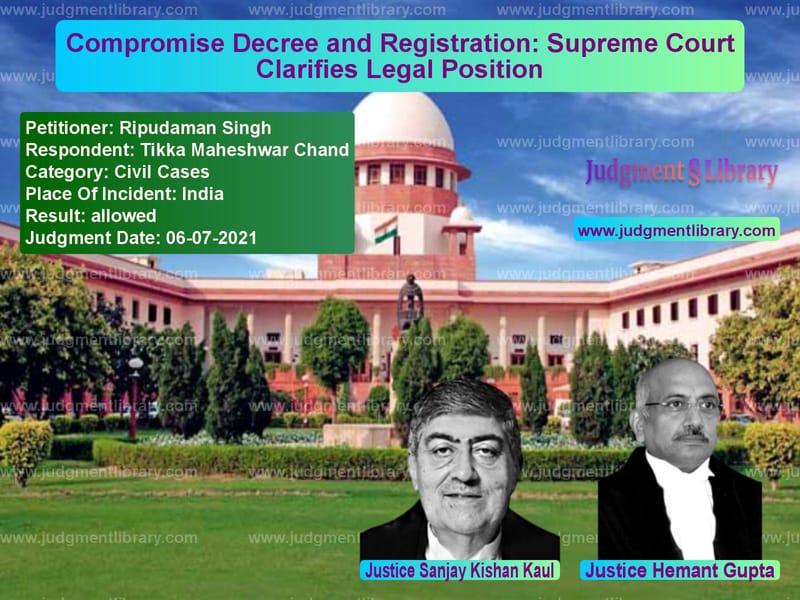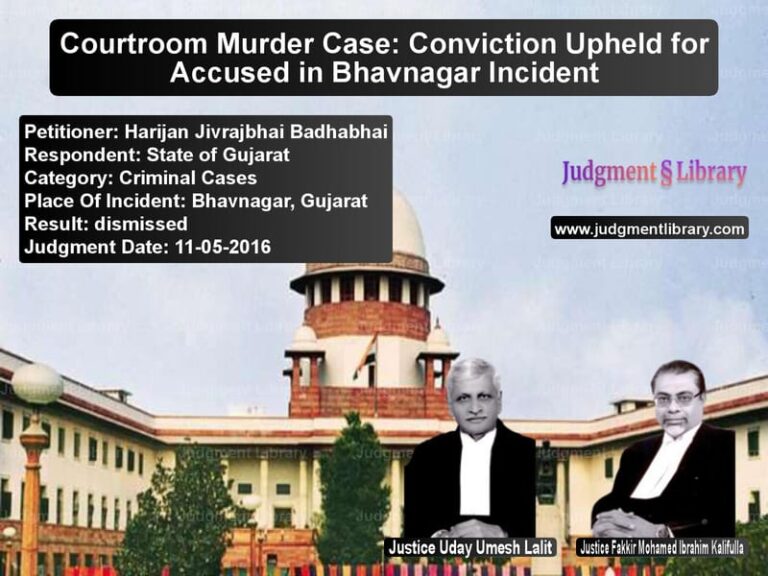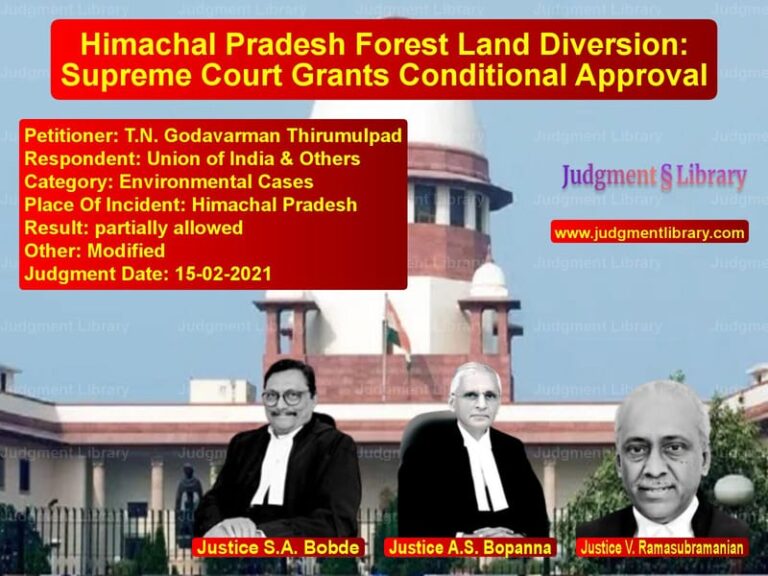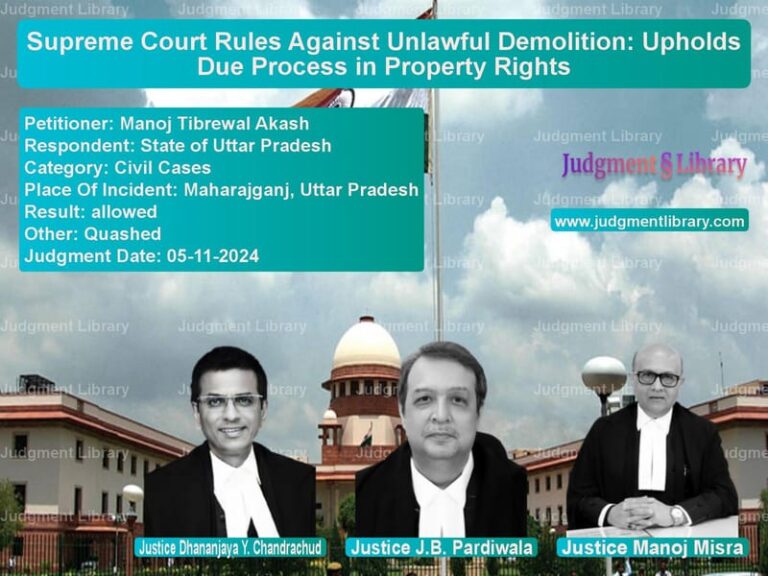Compromise Decree and Registration: Supreme Court Clarifies Legal Position
The Supreme Court recently delivered a significant judgment in the case of Ripudaman Singh v. Tikka Maheshwar Chand, addressing the question of whether a compromise decree involving immovable property beyond the subject matter of a suit requires compulsory registration under the Registration Act, 1908. The judgment was delivered on 6th July 2021 by a bench comprising Sanjay Kishan Kaul and Hemant Gupta.
The dispute arose between two brothers over ancestral property left behind by their father. The appellant, Ripudaman Singh, had earlier entered into a compromise with his brother, the respondent, which was recorded in a court decree. However, the validity of this decree was challenged on the grounds that it was not registered, leading to a protracted legal battle.
Background of the Case
The dispute began in 1978 when Ripudaman Singh filed a suit for possession, disputing the validity of a will executed in favor of his brother, Tikka Maheshwar Chand. The matter was settled through a compromise decree on 3rd November 1981, wherein both parties agreed on the division of property. The decree included agricultural and non-agricultural land.
Following the decree, the appellant sought mutation of his share in revenue records, which was initially approved by the Naib Tehsildar. However, upon appeal by the respondent, the mutation was set aside, citing that the decree involved land beyond the original suit and hence required registration.
Key Legal Issues
The primary legal question before the Supreme Court was:
- Does a compromise decree involving property beyond the subject matter of the original suit require compulsory registration under Section 17(2)(vi) of the Registration Act, 1908?
Arguments by the Appellant
The appellant argued that the compromise decree did not create new rights but only recognized pre-existing rights in the ancestral property. He contended that family settlements do not require registration as per settled legal precedents.
The appellant relied on the judgment in Kale v. Deputy Director of Consolidation:
“A family arrangement by which the property is equitably divided between various contenders to achieve an equal distribution of wealth is a milestone in the administration of social justice. The courts have leaned in favor of upholding family arrangements instead of disturbing them on technical or trivial grounds.”
Arguments by the Respondent
The respondent argued that the compromise decree covered land that was not originally part of the suit, thereby creating new rights. He asserted that under Section 17(2)(vi) of the Registration Act, any decree affecting immovable property outside the suit’s subject matter must be registered to be legally valid.
Supreme Court’s Judgment
The Supreme Court ruled in favor of the appellant, holding that the compromise decree did not create new rights but only recognized the appellant’s pre-existing rights in the family property. Therefore, it did not require registration.
The Court cited the landmark judgment in Bhoop Singh v. Ram Singh Major and reiterated:
“A decree or order of a court that merely recognizes pre-existing rights does not require registration. However, if the decree creates new rights, title, or interest for the first time, it must be registered.”
The Court clarified that the compromise decree in question was between family members and was part of an overall settlement of ancestral property. Since no new rights were created, registration was not mandatory.
Conclusion
The Supreme Court’s decision reaffirmed the legal principle that family settlements recorded in compromise decrees do not require compulsory registration unless they create new rights. This judgment provides much-needed clarity for individuals dealing with family property disputes and emphasizes the judiciary’s role in upholding settlements that promote harmony within families.
With this ruling, the appellant’s ownership claims were upheld, and the mutation process was validated, bringing a conclusive end to the long-standing dispute.
Petitioner Name: Ripudaman Singh.Respondent Name: Tikka Maheshwar Chand.Judgment By: Justice Sanjay Kishan Kaul, Justice Hemant Gupta.Place Of Incident: India.Judgment Date: 06-07-2021.
Don’t miss out on the full details! Download the complete judgment in PDF format below and gain valuable insights instantly!
Download Judgment: ripudaman-singh-vs-tikka-maheshwar-chan-supreme-court-of-india-judgment-dated-06-07-2021.pdf
Directly Download Judgment: Directly download this Judgment
See all petitions in Property Disputes
See all petitions in Succession and Wills
See all petitions in Landlord-Tenant Disputes
See all petitions in Judgment by Sanjay Kishan Kaul
See all petitions in Judgment by Hemant Gupta
See all petitions in allowed
See all petitions in supreme court of India judgments July 2021
See all petitions in 2021 judgments
See all posts in Civil Cases Category
See all allowed petitions in Civil Cases Category
See all Dismissed petitions in Civil Cases Category
See all partially allowed petitions in Civil Cases Category







